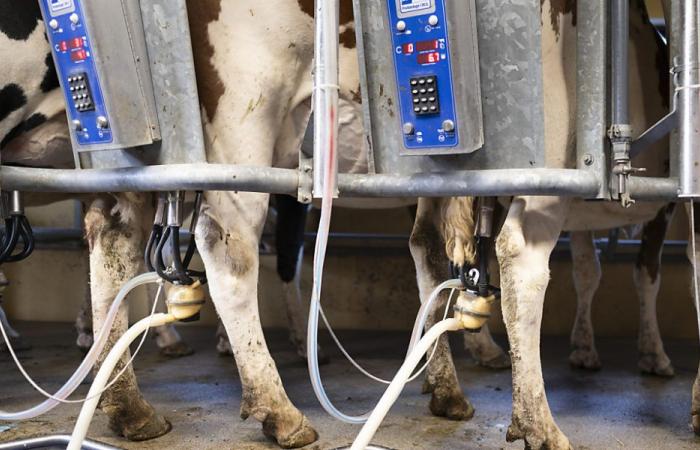The Confederation’s nutritional recommendations can significantly contribute to achieving Switzerland’s climate objectives, shows an analysis by Greenpeace and the WWF. As long as you favor the most environmentally friendly foods.
The Federal Council has set itself the objective of reducing the carbon footprint of food by 25% by 2030 compared to 2020 and by at least two thirds by 2050, the two environmental organizations recalled on Monday. In September 2024, the Confederation published new nutritional recommendations which take into account criteria linked not only to health but also to the environment.
On behalf of Greenpeace Switzerland and WWF Switzerland, the eco-balance specialists from ESU-Services analyzed to what extent this new food pyramid makes it possible to achieve the Confederation’s objective.
Great room for maneuver
The calculation compares the impact of current average Swiss consumption with the “Planetary Health Diet” – a diet developed by an international team of scientists to enable healthy and environmentally friendly eating around the world – as well as with two variants of the new food pyramid (minimum and maximum).
Two scenarios were taken into account in the Swiss nutritional recommendations, because there is a lot of room for maneuver. For meat, for example, the recommended amount is between zero and 360 grams per week.
The calculation takes into account a maximum variant, in which all foods that are particularly harmful to the environment – in particular meat and dairy products – are consumed in the maximum recommended amount. The minimum variant is based on the most ecological application of the recommendations, that is to say a vegetarian diet, without meat or fish.
Most beneficial minimum variant
The calculations indicate that a diet in line with the minimum variant of the nutritional recommendations would make an important contribution to an environmentally friendly diet and to the federal climate objectives.
This power supply has an impact on the climate that is half as heavy as a power supply with the maximum variant and two and a half times less significant than the current power supply. It even has less impact on the climate and the environment than the “Planetary Health Diet”.
Binding agreements required
To reduce the impact of food, individuals and households are not the only ones involved. Political authorities and economic actors also bear responsibility, note the two NGOs. Change requires concrete actions from each of them.
This includes removing the wrong incentives currently put in place by politics, retail and catering, which promote behavior contrary to sustainable and healthy eating. For this, binding agreements are necessary.
“Political authorities and the retail trade set framework conditions which determine the way we eat”, in particular by consuming too much meat and dairy products, underlines Mariella Meyer, sustainable food specialist at WWF, cited in the press release.
Agricultural policy 2030
“The analysis shows that an environmentally friendly food system is possible within the framework of dietary recommendations,” supports Barbara Wegmann, consumption expert at Greenpeace Switzerland.
“It remains to be seen whether politics, retail and wholesale trade and consumers are ready to take courageous and coherent measures to make this change in consumption possible. In this respect, agricultural policy 2030 is a great opportunity,” she said.
This article was automatically published. Source: ats






